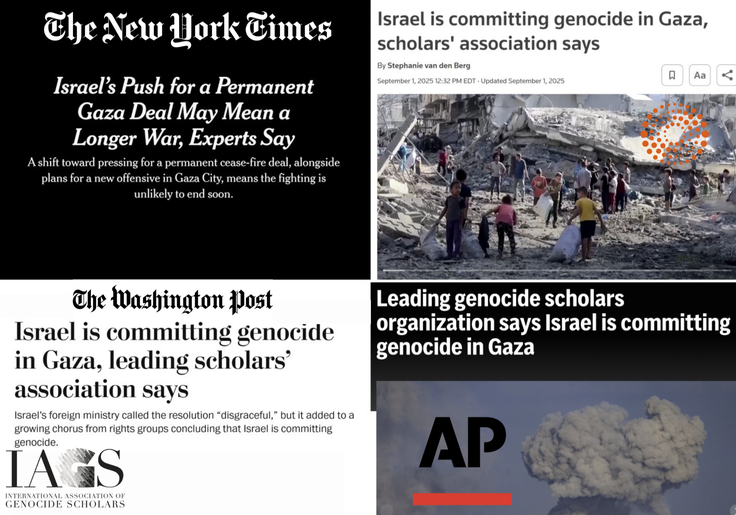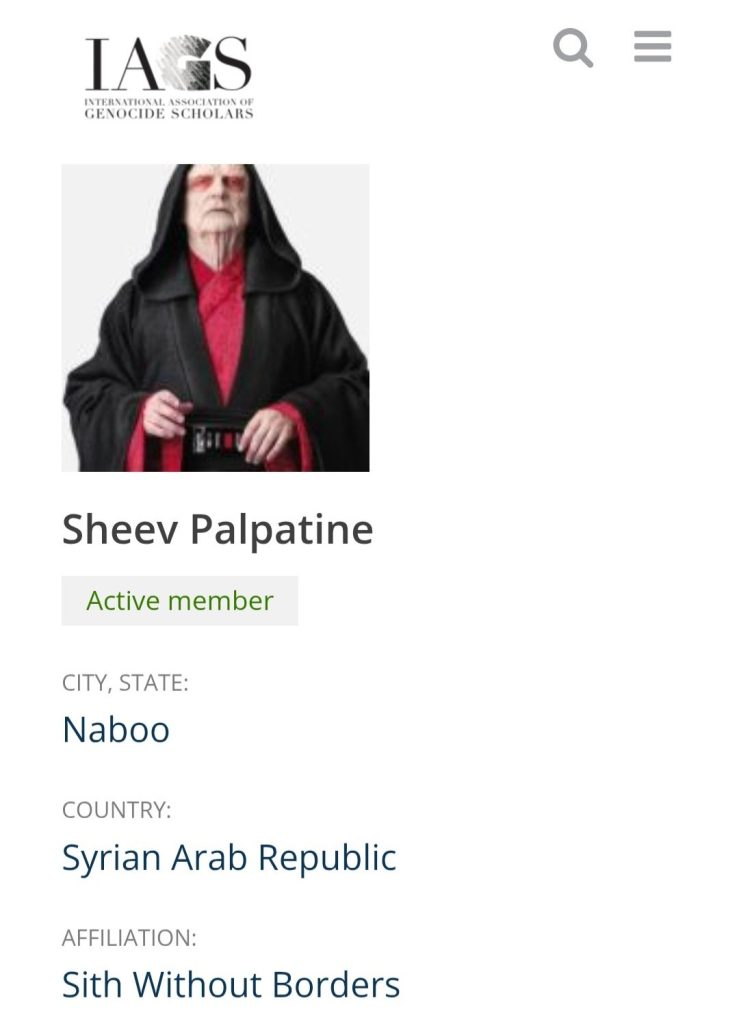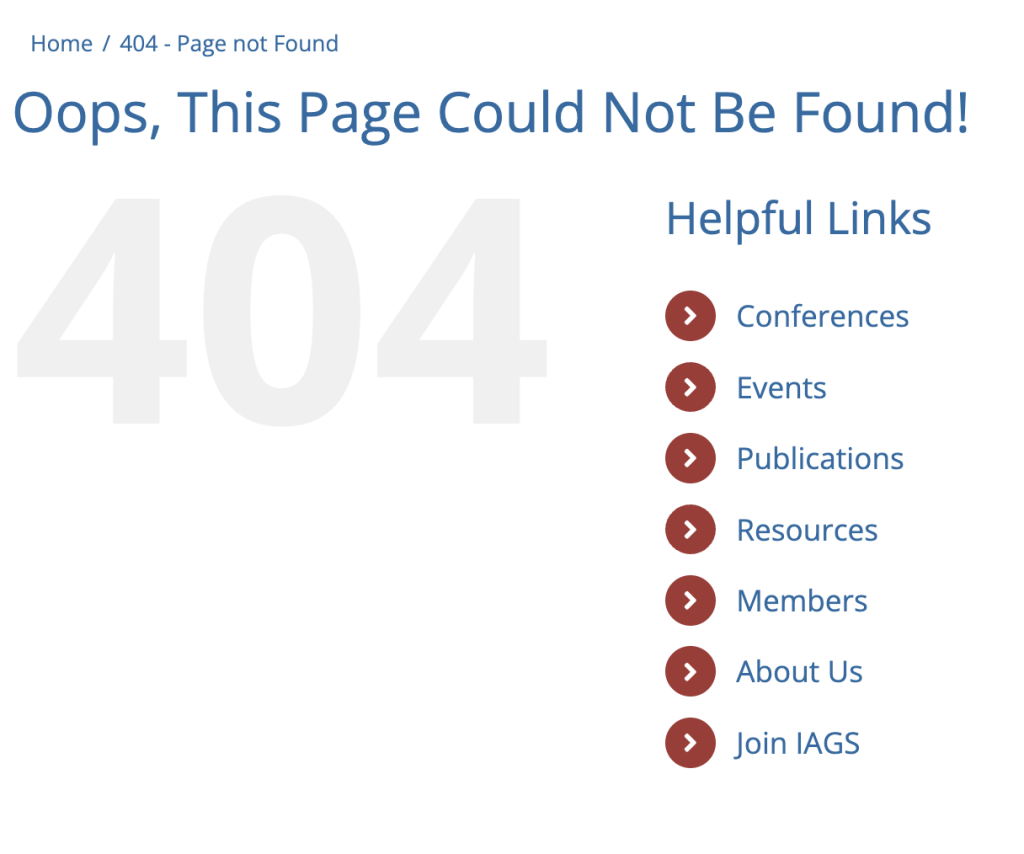Mainstream media reports lauded the International Association of Genocide’s unparalleled expertise. The group’s membership policies tell a different story.

When the International Association of Genocide Scholars (IAGS) passed a resolution declaring that Israel is committing genocide in Gaza, mainstream media outlets from the New York Times to the Washington Post to Reuters described the association as a “leading” academic voice on the topic. “On Monday,” the Times wrote, “the International Association of Genocide Scholars, a leading group of academic experts on the topic, declared that Israel’s policies and actions in Gaza met the legal definition of genocide.”
So what exactly is the IAGS? Though the association’s title indicates that the IAGS is composed of genocide scholars, its members actually include a swath of “academic scholars, human rights activists, students, museum and memorial professionals, policymakers, educators, anthropologists, independent scholars, sociologists, artists, political scientists, economists, historians, international law scholars, psychologists, and literature and film scholars,” according to its website.
Those who don’t fit one of those 17 titles need not be discouraged. To become an active IAGS member, one needs only to fill out a biographical form and pay a membership fee—$125 for a year, $210 for two years, or $1,200 for a lifetime. Doing so provides access to the association’s internal Listserv, newsletter, job listing notifications, calls for papers, and biennial conferences. It also unlocks the ability to “nominate individuals for and receive IAGS institutional awards” and join the “IAGS Women’s Caucus and the Indigenous People’s Caucus.”
The association’s bylaws, meanwhile, state that members must only “be current in their dues” to be considered in good standing—and propose resolutions on genocide. The IAGS executive board then determines “whether or not the proposed resolution will be submitted to the IAGS membership for a vote.” Voting is conducted via email.
Passing a resolution is not onerous, either. The permissive membership and resolution proposal policies are important because of the association’s low bar for passing resolutions. “For a proposed resolution to pass,” IAGS bylaws state, “voting must have been undertaken by a quorum of more than 20% of paid up IAGS members at the time of the vote.” The association says it represents “600 members from all continents.” Only 129 of those members, or roughly 22 percent, voted on the Gaza resolution, according to Sara Brown, a longtime IAGS member who served on its advisory board. The IAGS told the Post that 86 percent of respondents voted in favor of the resolution. That amounts to roughly 110 yes votes reflecting just 18 percent of the group’s total membership.
None of that context made its way into mainstream media coverage of the vote. The Times described the IAGS as “a leading group of academic experts on the topic,” while the Post called it “the oldest and largest association of genocide scholars.” The Post also touted the fact that a “large majority—86 percent—of members who voted on the resolution approved it” without noting that less than 30 percent of members actually voted.
While it’s unclear who exactly voted on the resolution, there’s reason to believe that at least some of the respondents were not “genocide scholars.” An archived version of the association’s public directory lists the first 10 IAGS members as of August 2024. Several have little to no online footprint, including an affiliation with a university of any sort.
Salo Aizenberg, an independent scholar who has contributed to the Times of Israel and Tablet magazine, registered as an IAGS member one day after the association released its Gaza report. He reviewed the Listserv and found that 80 members, or roughly 13 percent of the association’s “scholars,” were Iraqi. “I’ve been getting to know some of my fellow genocide scholars,” he wrote on X. “Seems that Iraq is a center of knowledge in this field with 80 listed scholars of ~600.”
In doing so, Aizenberg inspired a wave of individuals to join the IAGS, including some using names like Mo Cookie and Sheev Palpatine.
 The IAGS responded by purging its new members and taking down its public member directory.
The IAGS responded by purging its new members and taking down its public member directory.
But the association does not appear to have scrutinized new members prior to the release of its Gaza report. Its bylaws require the executive board to conduct periodical reviews ensuring all members are “current in their dues” but do not require them to prove their scholarly qualifications.


Brown, the longtime IAGS member and genocide scholar who holds the first Ph.D. in comparative genocide studies from Clark University, told the Washington Free Beacon that, as a member of the association’s advisory committee, she was never asked to vet any new members.
“To renew your membership, to become a member, it’s a pretty transparent process,” Brown said. “As long as you’ve paid your dues, you can vote.”
“It is not guaranteed that they are, in fact, experts by way of being, you know, practitioners engaged in the field, or scholars engaged in scholarly discourse, and research,” she continued. “How many are actual scholars, and how many are activists?”
The IAGS did not respond to a request for comment on the Gaza resolution vote, its vetting process, and its decision to take down its online directory and prevent new members from registering.
Jessica Schwalb contributed to this report.

















